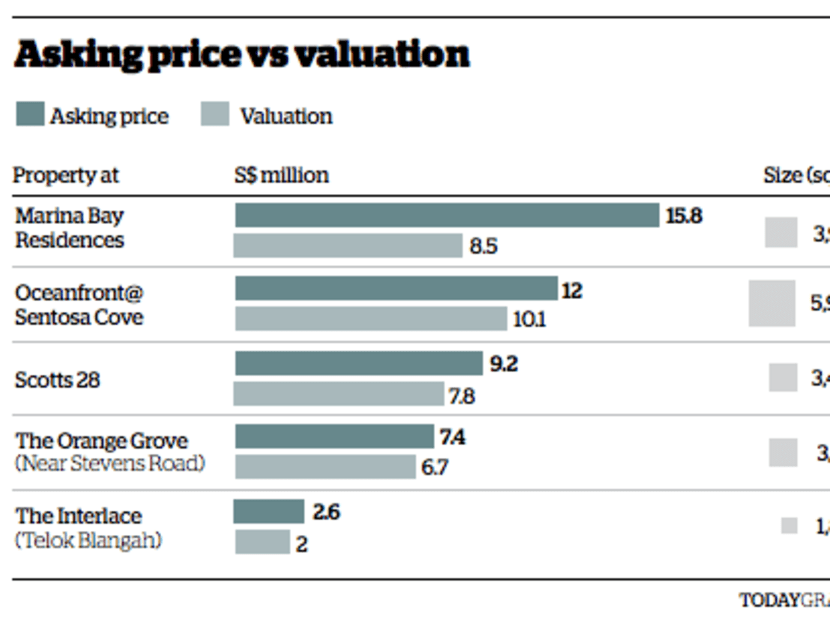Owners of top properties refuse to budge on prices despite downturn
SINGAPORE — Despite the downturn in the residential real estate market, asking prices for many homes remain sky-high with owners refusing to budge, at a time when bargain hunters are scouring the market.
SINGAPORE — Despite the downturn in the residential real estate market, asking prices for many homes remain sky-high with owners refusing to budge, at a time when bargain hunters are scouring the market.
Out of 20 properties randomly sampled by TODAY, the asking prices of only two are below valuation. The rest are all seeking prices higher than valuation, with eight properties asking for at least 20 per cent more than what their properties are assessed to be worth.
For instance, the owner of a 3,972 sq ft unit at Marina Bay Residences is asking for S$15.8 million, an 85.9 per cent premium above the valuation of S$8.5 million.
Over at The Oceanfront@Sentosa Cove, the asking price for a 5,984 sq ft unit is S$12 million, 18.8 per cent above the valuation of S$10.1 million.
It is the same story at properties in the Scotts Road area, where the price tag of a unit at Reignwood Hamilton Scotts is S$10.8 million, a 21.3 per cent gap against a valuation of S$8.9 million.
But the gap narrows at lower-end residences, with a unit at the Florida condominium in Hougang being hawked for S$1.5 million, a mere 2.7 per cent above a valuation of S$1.46 million. At Castle Green at Yio Chu Kang Road, the price gap was 4.8 per cent at S$1.1 million versus S$1.05 million.
“Many sellers today remain ill-advised or are simply out of touch with reality, asking for sky-high prices and wasting time, money and effort,” said Century21 CEO Ku Swee Yong.
“In this market, are you serious about selling? If agents spend money on advertisements and efforts in trying to sell your property, which the bank values at S$2 million, and buyers can get a loan for only S$2 million, why ask for S$2.6 million?” he questioned.
There are transactions, of course, that are not so far off the reality grid. Records show that a 1,743 sq m unit at Scotts 28 sold for S$3.7 million last September. At Marina Bay Residences, a 4,488 sq ft unit was moved at S$13.8 million last October.
But more often than not, property analysts and agents say, there is a stubborn mismatch between unrealistic seller expectations — even in the current depressed market — and buyers standing their ground in their hunt for bargains. The result? An impasse, leading to fewer transactions all round.
“When the market is cool, valuation is often below asking price, because people simply don’t believe yet that their property is valued at a lower price,” said Mr Nicholas Ramsay of property listings portal PropertyGuru.
Property agent Jeff Foo, also president of the Institute Of Estate Agents in Singapore, added: “Some sellers till today are not realistic … A lot of buyers too are adopting a wait-and-see attitude, because they are hoping for cooling measures to be tweaked. However, if people want a particular location or if they like the uniqueness of a property, they will still buy,” he added.
On the seemingly wider price mismatch at the more luxurious properties, Dr Chua Yang Liang, head of research and consultancy at property firm Jones Lang LaSalle, said: “These higher-end products (especially with waterfront) are rarer. There are fewer transactions to guide valuation and the sellers, hence, I believe this leads to greater variation in prices (valuation versus asking). Normally, sellers have an upside bias. This biasness gets more pronounced when the assets are rare.”
Additionally, valuations for higher-end units might be trending lower due to weaker demand, some analysts said.
High-end units tend to be bigger, which only the very rich or foreigners can afford, said Mr Colin Tan, director of research and consultancy at Suntec Real Estate. Demand for such units has decreased in recent times, he added, as the Singapore dollar has depreciated against the United States currency, making it less attractive for foreigners to invest in properties here.
“Now, it is even harder to get buyers … and there is an oversupply of such units. Some may have decided to try to let go, which may have accounted for declining prices. However, others may not need to sell if they can maintain their mortgage payments.”







